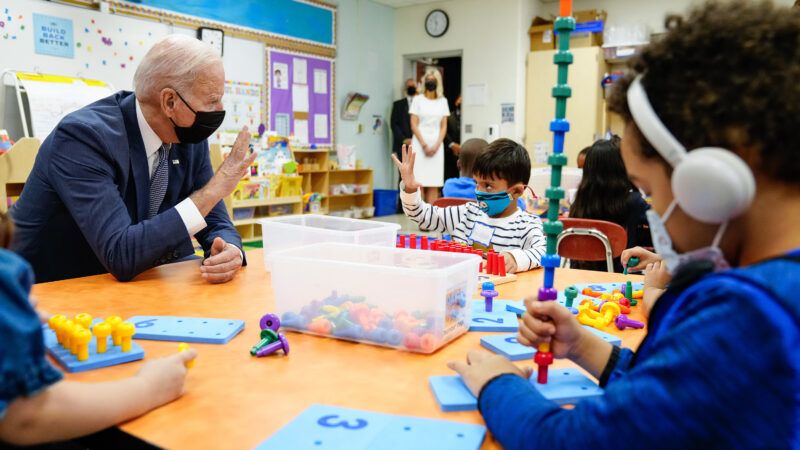Biden's Claims About Universal Pre-K Are Malarkey
During the State of the Union, Biden claimed that "children who go to preschool are nearly 50 percent more likely to finish high school and go on to earn a two- or four-year degree," but evidence in favor of universal pre-k programs is lacking.

During President Biden's State of the Union address this Tuesday, he called for expanding access to preschool for American 3- and 4-year-olds. In doing so, he made a startling claim about the effectiveness of preschool programs, stating that "children who go to preschool are nearly 50 percent more likely to finish high school and go on to earn a two- or four-year degree, no matter their background they came from."
However, such dramatic evidence in favor of preschool—especially the public "universal pre-k" programs Biden has consistently advocated for—is spotty. This is particularly true when trying to give public preschool credit for positive outcomes—like college attendance—that occur over a decade later.
While details vary, many American states and cities allow a certain percentage of parents to enroll their children in one or two years of publicly funded prekindergarten education. These programs have blossomed over the past two decades, with all but four states having some public preschool programs. Universal pre-k has become a favorite policy proposal for Democratic candidates recently.
"We want to have the best-educated workforce. And that's why universal pre-K is going to mean so much," said Biden during a speech last January, "You know, it also increases exponentially the prospect of that child being able to, no matter what her background—or his or her background—get through 12 years of school and then go on—almost half go on to a two- or four-year college."
But the evidence in favor of publicly funded preschool programs is spotty.
"I haven't seen any studies that come close to supporting the claim that children who attend pre-school are nearly 50 percent more likely to finish high school and go on to earn a 2- or 4-year degree," Colleen Hroncich, a policy analyst with the Cato Institute's Center for Educational Freedom, told Reason. While some studies have found increases in high school completion and college attendance rates, Hroncich notes that "these studies generally have to make a lot of assumptions along the way to match an input at age 4 to an outcome 20 years later."
"There could be factors that lead parents to enroll their children in pre-k that play a role in college enrollment down the road," Hroncich added. "There are also studies showing no long-term effects from preschool. So, while it seems like many people see universal pre-k as almost a panacea that will cure what ails our education system, the evidence just isn't there."
Whether preschool improves educational outcomes later in life especially matters considering the $200 billion price tag attached to Biden's proposal. Parents with alternative preferences for their kids would be taxed to pay for expanding public pre-k, as would people with no kids.
"Parents have shown repeatedly that they have very diverse wishes when it comes to pre-k, with many preferring home-based or religious programs and part-time options. Decisions about education are best left to states, local communities, and—especially—parents," Hroncich notes. "As the federal government has gotten more involved in education, we've spent a lot more money, but we haven't seen improvements. There's no reason to expect a different outcome in pre-k."


Show Comments (39)